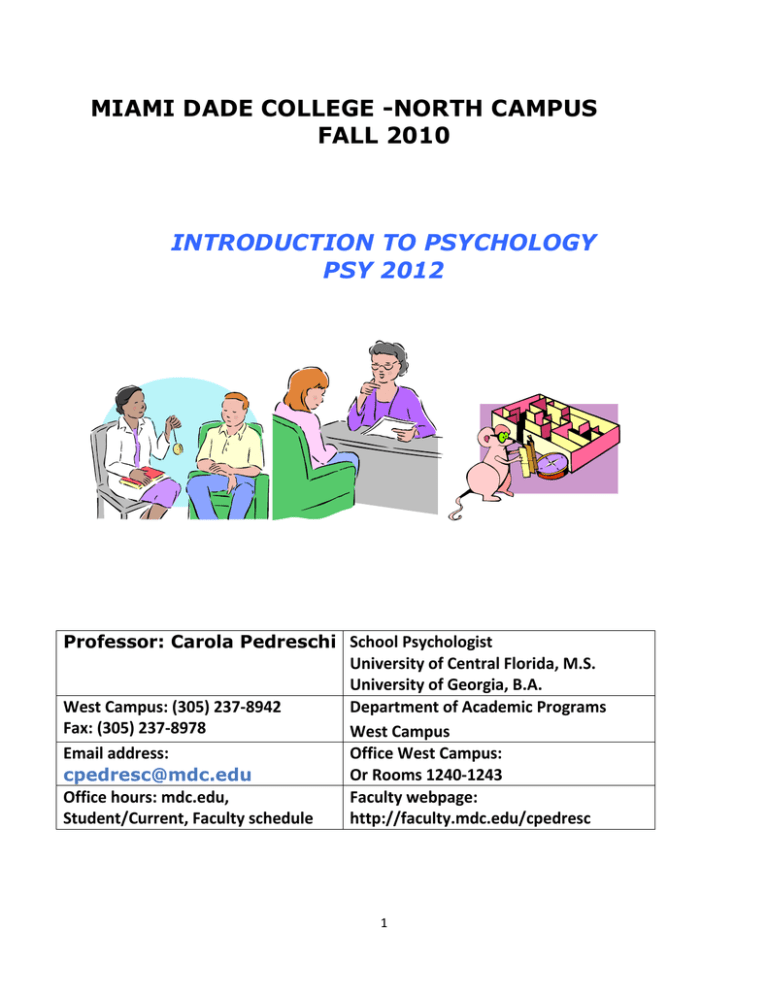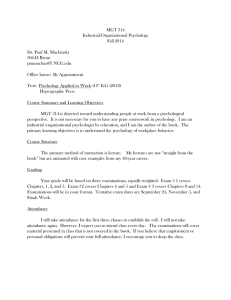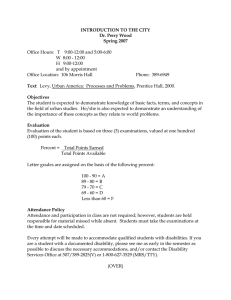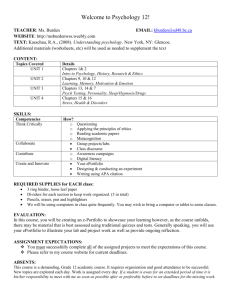MIAMI DADE COLLEGE -NORTH CAMPUS FALL 2010 INTRODUCTION TO PSYCHOLOGY
advertisement

MIAMI DADE COLLEGE -NORTH CAMPUS FALL 2010 INTRODUCTION TO PSYCHOLOGY PSY 2012 Professor: Carola Pedreschi School Psychologist University of Central Florida, M.S. University of Georgia, B.A. West Campus: (305) 237-8942 Department of Academic Programs Fax: (305) 237-8978 West Campus Email address: Office West Campus: Or Rooms 1240-1243 cpedresc@mdc.edu Office hours: mdc.edu, Faculty webpage: Student/Current, Faculty schedule http://faculty.mdc.edu/cpedresc 1 REQUIRED MATERIALS This is an interactive class, where students will be required to purchase a textbook and bring it to every class. TEXTBOOK Understanding Psychology - 9th Edition Robert S. Feldman ISBN-13 9780077406547 No code will be required – There is free access to learning resources for students STUDENTS MUST BRING THE TEXTBOOK TO EVERY CLASS, AS THEY WILL NOT BE TAKING NOTES DURING LECTURE. IT IS STRONGLY RECOMMENDED THAT STUDENTS USE A HIGHLIGHTER TO FOLLOW LECTURE. ENJOY LEARNING ABOUT PSYCHOLOGY BY READING THE ASSIGNED CHAPTERS AHEAD OF TIME AND USING THE ON-LINE LEARNING RESOURCES! COURSE DESCRIPTION This Course provides an overview of psychology as a social science and the methodology used in the field. Biological bases of behavior will be examined, as well as theories and concepts that provide explanations in such areas as personality, mental health, memory, intelligence, learning, motivation, and emotions. This course has value in helping students understand their own behavior as well as the behavior of others. Credits: 3 2 COURSE COMPETENCIES 1. The student will demonstrate knowledge of psychology as an academic discipline and profession by: -Describing the historical development of psychology -Comparing the educational background, training, and professional activities and various methods of scientific inquiry used in psychology. -Contrasting various methods of scientific inquiry used in psychology. 2. The student will explain the various theories of personality and behavior by: human -Contrasting psychodynamic, cognitive/social learning, humanistic and other theories. -Listing various categories of abnormal behavior and describing symptoms. -Distinguishing the various forms of treatment for mental, emotional, psychological disorders. -Discovering the influence of culture on personality. 3. The student will review biological bases of human behavior by: -Identifying the structures and processes of the brain and the nervous system. -Explaining the senses and how they function. -Discussing the nature/nurture controversy and its effects on human behavior. -Identifying connections between health and stress. 4. The student will investigate the cognitive aspects of human behavior by: -Discussing the concept of consciousness and altered states of consciousness. -Describing the various theories of learning, memory, and intelligence. -Relating how language and thinking affect human behavior. 3 STUDENT EVALUATION TESTS Student learning will be evaluated during the semester by taking graded tests and nongraded assessment tools. Six tests will be administered during the semester. Test dates will be announced ahead of time. Grades will not be rounded. Please purchase Scantron Forms, pencils, erasers, and White-Out or equivalent to completely erase changed answers. Students will not be allowed to take the tests if they do not bring their test-taking tools. They may go to the bookstore and purchase what they need before they take the test, but may not ask others for these items during testing session. TEST SCHEDULE TEST TEST TEST TEST TEST TEST # # # # # # 1 2 3 4 5 6 Chapters 1-2-3 Chapters 4-5-6 Chapters 7-8-9 Chapters 10-11-12 Chapters 13-14-15 Chapters 16-17 Students may only make-up one test. This test will not be the same test administered in class. The make-up test may be madeup after class only in agreement with the professor. Any other missed tests will receive a grade of zero. LETTER GRADE ASSIGNMENT A: 90-100 B: 80-89 C: 70-79 D: 60-69 4 F: 59- ATTENDANCE POLICY In order for effective learning to occur, students must attend all classes and must be in class by the scheduled start time. Student attendance is directly related to student success. Tardiness and absenteeism are unacceptable. ATTENDANCE WILL BE TAKEN AT THE BEGINNING OF EVERY CLASS SESSION. Students will not be allowed in class if the professor has finished taking attendance. This will be considered an absence. No explanations are necessary out of respect for the students’ personal lives. There are no excused or unexcused absences. Five points will be subtracted from the final grade when a student is absent four or more classes. Students will be dropped if they miss three or more classes consecutively. Keep records of your absences to increase awareness of your behaviors and improve attendance. Any differences in records between the professor and the student will be decided by the professor. It is now mandatory to keep accurate records of student attendance in order to receive federal funding. HONESTY AND REGISTRATION POLICIES Students are responsible for initiating and completing the process of officially adding or dropping a course. The highest academic standards are required of all MDC students. Any form of academic dishonesty during an examination or assignment or act of plagiarism, will result in a failing grade for the assignment, the test or the semester and a letter filed with the Office of the Registrar. *Please refer to MDC’s student handbook for questions regarding student rights and responsibilities* 5 CLASSROOM CODE OF CONDUCT No lecture interruption. Take care of personal matters before coming to class unless there is an emergency. Please inform your professor of any emergencies prior to start time. Students will not be allowed to get-up and leave class temporarily while class is in session. Contact your professor if you miss class. Obtaining information when you miss class is expected and it is the student’s RESPONSIBILITY. Students must completely turn off and put away all electronic devices. If the professor sees or hears any device outside book bags, purses or pockets, the student will be asked to leave the class and attendance will be affected. Please wait for your turn to share in class. Talking in class without permission is distracting and disruptive. Students will be warned once, but if this behavior is repeated the student will be asked to leave the classroom. Please respect the diversity of students present in our MDC classrooms. No food or beverages are allowed in the classroom. PSY 2012 FAMILY You will be asked to form a family of three members in class. The purpose is to develop a sense of belongingness, cohesion, and support throughout the semester and beyond. Please write the names and contact information of your family members on this form. this Family Members: 1. 2. 3. 6 SUGESTIONS FOR STUDENT SUCCESS: 1. 2. Attend ALL classes and be on time. Read your chapters ahead of time. You will be asked about chapter readings in class without notice. Read the outline of the chapter and its summary before reading the chapter. Take notes in your own words as you read the chapter. Test yourself before the actual test by using the list of key terms at the end of the chapter or the textbook website. Studying in groups can be fun and effective. Practice diaphragmatic breathing to relax before taking a test. 3. 4. 5. 6. The professor reserves the right to make changes on the syllabus at her discretion. Miami Dade College West Campus As graduates of Miami Dade College, students will be able to: 1. Communicate effectively using listening, speaking, reading, and writing skills. 2. Use quantitative analytical skills to evaluate and process numerical data. 3. Solve problems using critical and creative thinking and scientific reasoning. 4. Formulate strategies to locate, evaluate, and apply information. 5. Demonstrate knowledge of diverse cultures, including global and historical perspectives. 6. Create strategies that can be used to fulfill personal, civic, and social responsibilities. 7. Demonstrate knowledge of ethical thinking and its application to issues in society. 8. Use computer and emerging technologies effectively. 9. Demonstrate an appreciation for aesthetics and creative activities. 10. Describe how natural systems function and recognize the impact of humans on the environment. *Please note that not all of the above Learning Outcomes will be addressed in this course* Revised/updated 1/19/2010 7 IMPORTANT DATES Aug. 23 Aug. 28 Classes begin week day and evening Late registration begins ($50 fee) Saturday and Sunday classes begin Last day to change courses without penalty 100% refund - Mini term begins (12 week) Purge process begins Sep. Purge process deadline for no shows Aug. 28 Aug. 27 3 Oct . 19 Mid-term Nov. 2 Nov. 12 Last day to withdraw with a W Purge process ends Dec. 10 Dec. 17 Last day of lecture Last day of final exams HOLIDAYS Sep. 4-5-6 Saturday – Sunday – Monday Nov. 11 Thursday Nov. 25-26-27-28 Thursday - Friday NOTES Revised 8/23/2010 8



